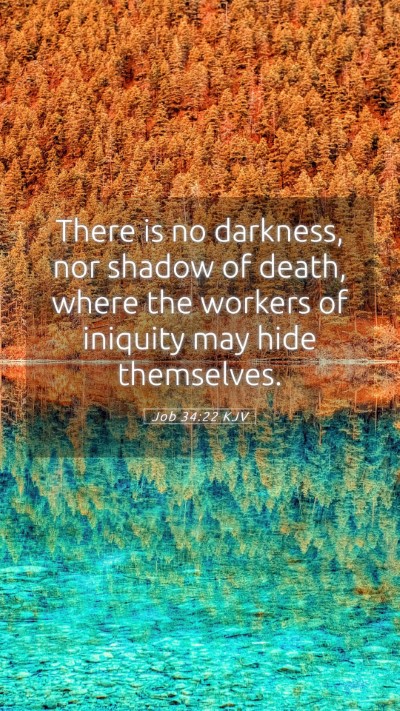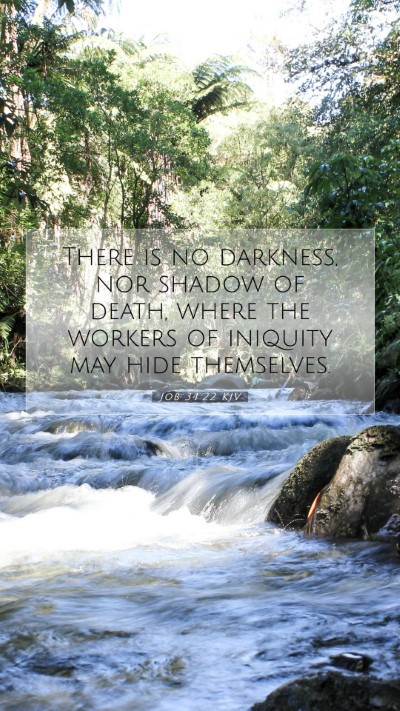Understanding Job 34:22 - A Comprehensive Commentary
In the Book of Job, Chapter 34, verse 22, we encounter a profound statement about the nature of God's justice and omniscience: "There is no darkness, nor shadow of death, where the workers of iniquity may hide." This verse provides us with crucial insights into God's ability to see and judge all actions, irrespective of human efforts to conceal wrongdoing. The following analysis synthesizes thoughts from respected public domain commentaries, offering a deep dive into the meanings, interpretations, and explanations of this scripture.
Biblical Context
Job 34:22 is part of a discourse by Elihu, one of Job's companions, who speaks about God's justice. Throughout this chapter, Elihu is emphasizing that God is fully aware of human actions. This verse highlights God's omnipresence, asserting that no one can escape His gaze, an essential aspect of Biblical exegesis.
Commentary Insights
Matthew Henry’s Commentary
According to Matthew Henry, this verse underscores the fact that God's judgment is always present and that no sinner can find refuge from divine scrutiny. He remarks that the figurative expressions of "darkness" and "shadow of death" symbolize the most hidden and desperate places where one might think they could escape their sins. Henry emphasizes that God's moral government means He sees all, reinforcing the importance of living righteously as there is no hiding from God's justice.
Albert Barnes’ Notes on the Bible
Albert Barnes offers a similar reflection, stating that the "workers of iniquity" are fully visible to God, regardless of their attempts to hide their actions. Barnes suggests that the verse serves as a reminder of the inevitable confrontation with divine justice every individual will face. His commentary indicates that this passage is meant to evoke a sense of accountability before God, encouraging believers to conduct themselves with integrity.
Adam Clarke’s Commentary
Adam Clarke further elaborates on this theme, emphasizing the omniscience of God. Clarke notes that "darkness" does not exist for God as He is the ultimate source of light and truth. He explains that the imagery used in the verse illustrates the futility of human efforts to evade accountability for wrongdoing. Clarke posits that understanding the nature of God’s watchfulness is crucial for any serious Bible study insights, as it calls believers to a higher standard of living and integrity.
Theological Implications
The implications of Job 34:22 extend beyond mere observation; they touch upon the nature of God's moral governance and the anxiety human beings might experience when contemplating divine justice. The verse serves as a sober reminder that actions have consequences and that God, in His infinite wisdom, will judge righteously.
Applications of Scripture
For those engaged in Bible study groups or personal online Bible study, Job 34:22 can serve as a focal point for discussions about accountability and integrity in faith. It can lead to thoughtful debate on how believers can consciously live in the light of God’s omniscience, promoting an authentic Christian walk.
Related Cross References
- Psalm 139:7-12 - This passage reflects on the inescapability of God's presence, emphasizing that there is nowhere to flee from His Spirit.
- Proverbs 15:3 - This verse acknowledges that the eyes of the Lord are everywhere, observing both the good and the evil.
- Hebrews 4:13 - This New Testament reference reinforces the concept that all things are naked and open unto the eyes of God, calling for self-examination and honesty.
Conclusion
Job 34:22 serves as a powerful reminder of God's omnipresence and upholds the belief that nothing escapes His notice. For anyone seeking Bible verse meanings or interpretations, understanding this scripture is crucial for grasping the broader themes of accountability, justice, and the moral requirements placed upon believers. Engaging deeply with this passage provides vital insights that can influence both personal conduct and communal discourse within Bible study resources.


